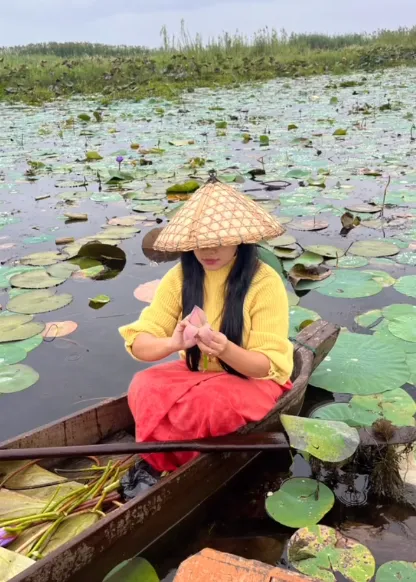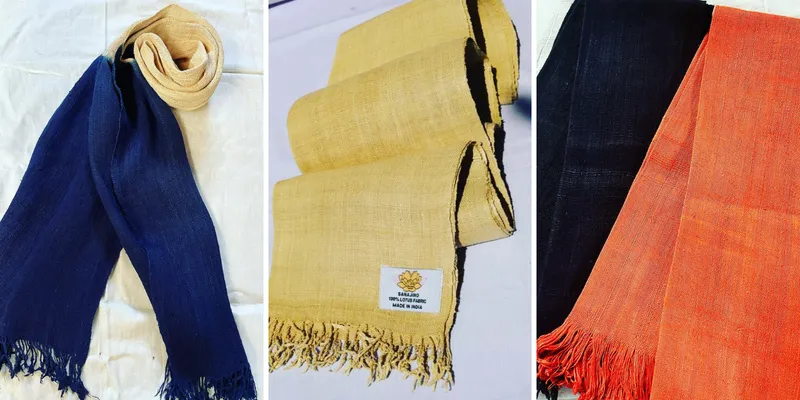Woman entrepreneur from Manipur is weaving success by making clothes from lotus stem fibre
Bijiyashanti Tongbram uses the abundant lotuses found in Loktak lake near her home in Thanga village in Manipur to extract fibre from its stems. This is used to weave products like scarves, mufflers, stoles, and neck ties.
In the 100th episode of Mann Ki Baat in April 2023, Prime Minister Narendra Modi reconnected with Bijiyashanti Tongbram, an entrepreneur from Manipur, congratulating her on creating opportunities for rural women.
In 2020, the PM had praised her efforts in starting her unique venture, Sanajing Sana Thambal on his radio show.
Tongbram, a botanist by qualification, is the first in the country to extract fibre from lotus stems and weave them into different accessories like stoles, scarves, mufflers, and neck ties, coloured with natural dyes.
For two years, Tongbram had been trying to showcase and sell her unique work but was disappointed when there were no takers.

“Mann Ki Baat changed my life forever. In less than 24 hours, whatever stock I had was completely sold out, and I was inundated with orders,” she tells HerStory.
She also adds that she has no idea how the Prime Minister came to know of her and her work, but is happy that women entrepreneurs that run small businesses are getting the attention they deserve.
Eco-friendly fabric from lotus stems
Tongbram grew up in Thanga village in Bishnupur district of Manipur close to the Loktak lake. After completing her schooling in her village, she moved to Imphal for a graduate degree in Botany. She started an agri tourism business, but that didn’t do too well.
Tongbram had always been fascinated by the lotus flowers that grew in abundance in Loktak lake. She recalls that a stray thought entered her mind–why not trying using the lotus to make different products.
She pored over journals and research studies to understand the properties of the lotus flower. She understood that while the flower is used, usually the stems go to waste. Using this as a base, she studied more about eco-friendly fabrics and decided to experiment with the lotus stem to make fibre.
The idea took root in her mind in 2017 and she worked for two years on extracting fibre from lotus stems. She also joined an entrepreneurship training programme organised by the Ministry of Micro, Small & Medium Enterprises (MSME).
“I understood from my research that the lotus plant has a lot of medicinal values–tea can be made from lotus petals and the stalk is one of the most eco-friendly fibres. It is a naturally soft and breathable fabric and almost wrinkle-free,” she says.
The power of a women’s collective

Products made with lotus stem fibre
Visiting the lake in the early mornings, Tongbram collected the stalks and soaked them in water for a day to soften the fibres. Using a small knife, the stalks are cut to extract filaments. Using the palm of the hand and a plank, the fibre is then rolled. This fibre is used to weave into different products.
“I started a collective, Sanajing Sana Thambal in 2019 working with 10 women locally who helped in extracting the thread from the fibres. I taught them how to do this in the confines of their homes, which also gives them an income to support their families. I also collaborated with weavers in my region who started working with the lotus stem fibres to fashion them into different products,” Tongbram adds.
The collective now has 30 women, and two weavers work full-time at the unit in Thanga. The products are sold through the Sanajing Sana Thambal website and its Instagram page, and are also customised according to requirements. The women earn between Rs 7,000-12,000 per month according to the quantity of work and the hours they put in.
In its present size, she believes three-five orders a month are enough to sustain the business.
She explains, “The price of the products are quite expensive–a scarf costs upwards of Rs 18,000 and the price per metre of fabric starts from Rs 27,000. Also, it takes two months to make a scarf as collecting lotus stems, extracting fibre, and weaving takes time. Also, stems cannot be collected and stored, they have to be used fresh.”
She adds that for big orders, she starts the process from scratch.
Tongbram has received support from the North East Entrepreneurs Fund, and the Assam Agricultural University for technology and mentorship. Recently, she had to decline a huge order from Texas because her unit was not equipped to meet the demand. Her main challenge is the time taken for the process.
“I am hoping to scale my business and I am looking for funding to aid this. I also want to employ more women and make more products with lotus stem fibre and tap into bigger markets,” she says.
Edited by Megha Reddy







